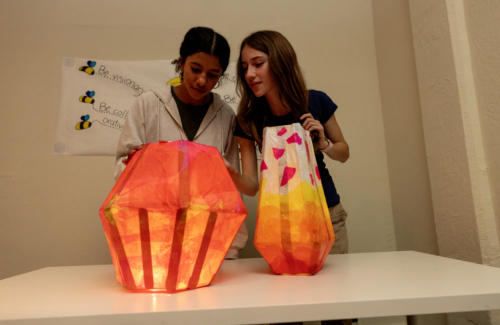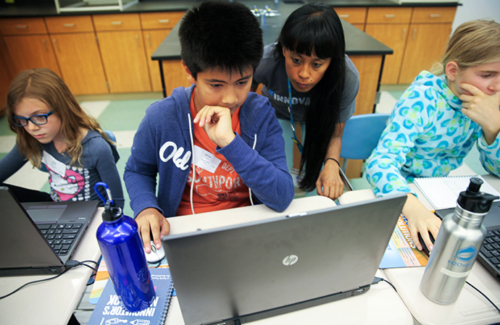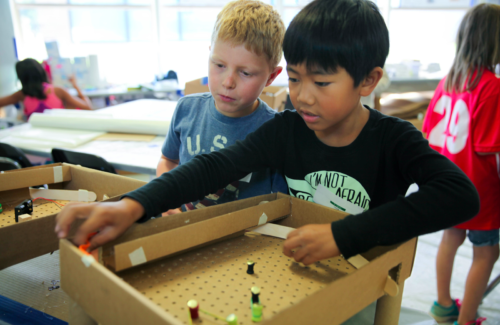Summer Science Camp Themes: How to Choose the Best One for Your Child

Kids have a strong affinity for science right from the beginning. They are born with keen observational abilities and strong curiosity—two key characteristics of scientists. Babies use this power of observation, guided by their senses, to explore and construct their earliest understanding of the world. What infant hasn’t wordlessly challenged their parents to join their gravity experiments conducted from the high chair? What toddler hasn’t tested force and motion by sending a toy (or themselves!) crashing into an obstacle?
As kids grow, they build their knowledge by connecting new observations with their existing framework and the things they have already learned. Complex neural connections are made beginning in the preschool years that lay a foundation for the cognitive, social-emotional and physical growth to come. Kids’ worlds are opened by the opportunities we provide for them to exercise their innate curiosity in building science knowledge. A summer camp program that incorporates science into its curriculum can be an awesome way to boost science learning in a relaxed atmosphere when school is out. But with so many great summer science camp themes available, it can be hard to choose the best one for your child.
The Benefits of Science Camp
There is a science camp for everyone. With so much natural curiosity, it is an appropriate summer endeavor for kids of all ages, and the benefits are manifold.
- Science is essential. It helps us understand the building blocks of our worlds.
- Science is fun. There is always something new to discover about how things work.
- Science connects us. It offers amazing opportunities for teamwork and collaboration.
- Science and technology are tightly interwoven. We live in a fast-paced world where innovation brings us new marvels every day.
Summer camp is the perfect place for kids to better understand and practice these foundations of science learning.
How to Choose the Best Science Camp for Your Child
When selecting a summer science camp, it is important to consider your objective, and that of your child. Is your goal to feed a strong passion or encourage a new interest? Are they hoping to develop new skills or competencies? Check out potential careers? Discuss these factors together to help narrow your search:
- Decide on a level of specificity. A thematic camp that incorporates science learning with other disciplines, such as art and outdoor adventure is a great choice for younger kids. Older kids may be ready for a narrower focus, like one that allows them to specialize in game design or electronic circuitry.
- Think about the venue. Many science museums, zoos, aquariums and farms offer summer camp opportunities for kids. If these are your kid’s favorite places, check out what they have to offer when school is out.
- Consider the branch of science. A Physical Science enthusiast will enjoy building catapults or go-karts, while an Earth & Space Science buff may prefer space camp. Life Science fans may choose an ecosystem adventure or a camp that introduces human or veterinary medicine. Kids interested in Engineering & Technology have lots of choices, including things they may have never even thought about before, like catapult building!
- Find out if the camp is responsive to trends and advancements. There is a lot of interest currently in coding camps for kids, and many options exist. Look for a camp that boasts the latest in both hardware and software.
- Think about the opportunity to explore a science career at camp. A kid who never even know they had an interest in engineering may discover this passion at summer robotics camp. Many summer day camps offer kids the chance to immerse themselves in their first exposure to a new favorite subject.
- Consider your child’s personality and where their strengths lie. A kid who loves solving mysteries will enjoy escaping from a mystery room and then helping to plan an adventure for others to solve. Or perhaps they prefer to use their problem-solving talents to conduct crime scene investigations. Think of their unique talents and interests, and find a program that will be enjoyable, but also a learning experience.
- Look for bonus factors. Besides being fun and providing science adventures, some camps have additional perks, such as extended care. Others help kids develop soft skills and a mindset that promotes success. Programs designed and staffed by science educators are especially advantageous. And some camps offer early registration discounts.
Have Fun Considering the Possibilities
Don’t forget to enjoy the experience of finding the best summer science camp theme for your kids, and use it as an opportunity to get to know them even better. Most camps have extensive websites that provide a wealth of information for prospective campers and their parents. As you explore the camp’s website with your child, look for detailed descriptions of their various program offerings and samples of the daily schedule. Some will post lunch menus, and most feature reviews from former campers and their parents. Look for frequently asked questions that provide answers for you, and if they don’t address your question, call the camp directly. The best camps will be eager to talk to you and your child to help you make a decision. It’s a safe bet that there is a perfect science camp for your child.
Check out the plethora of summer science camp themes in your area: San Francisco, Southern California, and Chicagoland. Enroll in camp today or sign up for our mailing list to keep up-to-date on our camp happenings and innovation resources. Or, for more information about Galileo camps, contact us here.

 Self Directed Learning: Project Ideas to Inspire Innovation and Leadership
Self Directed Learning: Project Ideas to Inspire Innovation and Leadership  Getting Kids Inspired with Brain-based Activities
Getting Kids Inspired with Brain-based Activities  Incorporating Mindfulness to Help Elementary Students With Concentration and Collaboration
Incorporating Mindfulness to Help Elementary Students With Concentration and Collaboration 